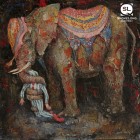Your bio reveals you to be a real citizen of the world. You worked for a Swedish magician, a Chinese opera troupe; you have a name that seems both Greek and Indian; you are in an Asian writers’ anthology; you live in Singapore. Where’s home for you? And I guess I mean more than “Where do you live?” And how do you know when you’re there?
That’s the thing about living in Singapore, though—it’s bound to be a multicultural experience; everything is so diverse: from the languages you hear on the streets to the food. It’s really not unusual here to be privy to a whole host of intercultural experiences on a daily basis. But I guess what home is for me isn’t something really tangible. Of course there are physical places that will always hold a place in my heart, but that’s only because of the experiences I have had there—and these are made up of interactions with people that I hold, or have held, dear. People, as clichéd as it sounds, are a huge part of what is home for me. That comfortable feeling, you know? Like everything is all right, everything is where it should be.
Your work is strikingly visual. A favorite passage: Everything flew all over the room: the leaf skeletons, the papers, the pencils. All of it, everywhere. I rolled over in bed and a sheet of music was stuck to my back. Do you have any specific method for honing your sight?
I don’t really have a specific method; things just happen to strike me very easily. Like, I could be walking down a street and be hit by the way the sky looks on a certain day, or how the curtain looks when the wind comes in through the window. I love describing those simple things; it makes them more real to me. It cements a story in reality, all these little details. I really just pay attention, I guess, and enjoy describing what I see.
I occasionally drink sweetened condensed milk from the tin. What’s your secret shame? (I ask this with the understanding that no one really shares her most embarrassing moment, her true worst self, her most shameful secret shame. I think we usually leap to, like, tenth worst. Or twentieth. Or hundredth. But let’s see what you come up with.)
Well, I don’t drink condensed milk, but in the same vein I sometimes eat Milo powder straight out of the tin when I’m making it. I’m always tasting things before they’re ready for consumption, food on the counter—or the final product. I’m very impatient.
I’m drawn to the modular approach to story—six similarly sized chunks that almost seem like they could be switched around. Although the actual last section ends on a very final note, I would find any arrangement of chunks satisfying. Is that an important part of your writing project? I’m referring to the nonlinear nature of this story.
It depends, really. A lot of the things I write are very vague, very foggy. I didn’t even name the characters in “Glint” because it didn’t feel right to name them. And I do tend to do that often, that vagueness. I would say that for the most part, the chronology of events could be interpreted in any way; here the chronology, apart from the ending, wasn’t that much a huge aspect of the story as much as me telling what had happened: not so much the order of which it happened, but the events themselves. So I guess it really depends. Some of my stories are linear, and some aren’t. I guess this one just falls into the latter category.
Where do you find your inspiration? I almost see you working from an image, as I do—but I’m a poet, not a fiction writer. I could see this specific story starting with the hole in the window, or the spidery mascara, or the bloody finger. I’d be interested in hearing about your inspiration in general, and also your inspiration for this story.
I really do get inspiration from anywhere; maybe I’ve been reading and a string of words just happens to hit me, or when I’m taking the bus and looking out of the window I see something—even in songs; I’m not talking about just the lyrics, but the instrumental parts. For example, if the song uses wind chimes that can conjure up a whole scene for me, I describe music using places. In particular, I like writing about the light, the way it falls, the way it looks. I like writing about the small things that happen in people’s lives, all the things that are only significant to those they happen to. All the small things, you know? I really like writing about that.



 The SmokeLong Grand Micro Contest (The Mikey) is now an annual competition celebrating and compensating the best micro fiction and nonfiction online.
The SmokeLong Grand Micro Contest (The Mikey) is now an annual competition celebrating and compensating the best micro fiction and nonfiction online.